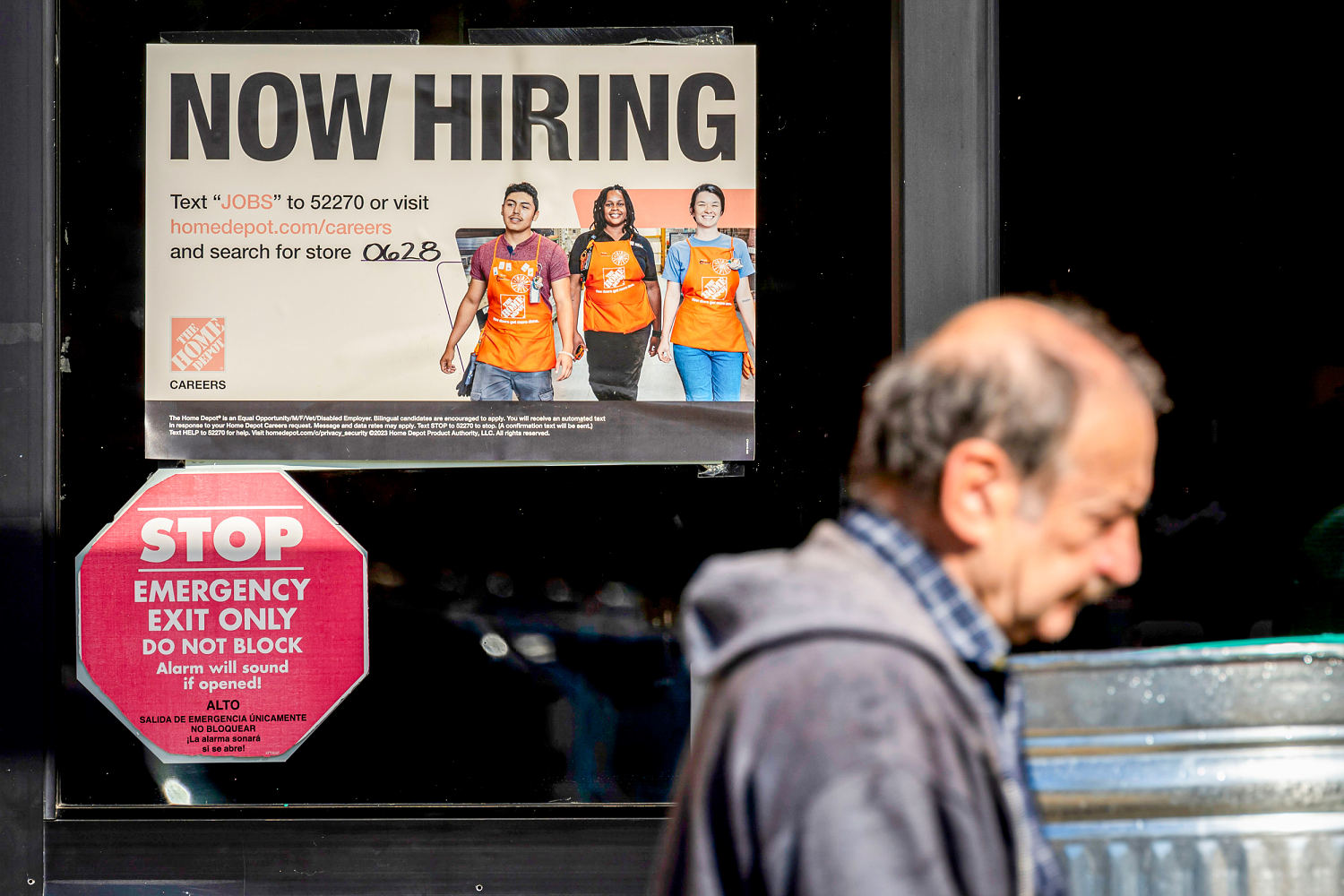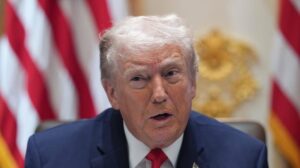The Dictatorship
Final jobs report of the Biden era shows strong U.S. growth

Expectations heading into this week showed projections of about 155,000 new jobs having been added in the United States in December. As it turns out, according to the new report from the Bureau of Labor Statistics, the totals were far better than that. NBC News reported:
President Joe Biden will end his term with a relatively healthy labor market as the United States added a surprising 256,000 jobs in December and the unemployment rate ticked down to 4.1%. … On their own, the latest figures indicate the U.S. economy has largely achieved the “soft landing” scenario Biden sought: relatively low unemployment and relatively low inflation.
In addition to the very encouraging top-line data, the same Labor Department report showed that wage growth continued to outpace inflation.
As for the political picture, let’s circle back to previous coverage to put the data in perspective. Over the course of the first three years of Donald Trump’s presidency — when the Republican said the U.S. economy was the greatest in the history of the planet — the economy created roughly 6.38 million jobs, spanning all of 2017, 2018 and 2019.
According to the latest tally, the U.S. economy has created over 17 million jobs since January 2021 — nearly triple the combined total of Trump’s first three years. (If we include the fourth year of the Republican’s term, the data looks even worse for him.)
What’s more, while the data from 2024 will still be revised once more, if the final tallies are in line with the available information, the U.S. economy added 2.2 million jobs last year — more than the totals from 2017 and 2019, when Trump falsely claimed that the job market had reached all-time highs.
While we’re at it, let’s also note that over the course of the last 48 months, there were literally zero months in which the U.S. economy lost jobs — the last time job growth turned negative was in December 2020, the last full month of the Trump era — and Biden is leaving the White House with a 4.1% unemployment rate, the lowest for an outgoing president since Bill Clinton, and the second lowest since Lyndon Johnson. (The jobless rate was 3.9% in December 1999. It was 3.5% when LBJ left office.)
The New York Times recently concluded that the job market “is as healthy as it has ever been” — as in, in the history of the United States — even if that’s at odds with public perceptions, even if Biden isn’t getting the credit he deserves, and even if his successor isn’t prepared to admit it.
For some additional context, consider job growth by year over the past decade, updated to reflect the latest data revisions:
2013: 2.3 million
2014: 3 million
2015: 2.7 million
2016: 2.3 million
2017: 2.1 million
2018: 2.3 million
2019: 1.98 million
2020: -9.3 million
2021: 7.2 million
2022: 4.5 million
2023: 3 million
2024: 2.2 million
This post updates our related earlier coverage.
Steve Benen is a producer for “The Rachel Maddow Show,” the editor of MaddowBlog and an BLN political contributor. He’s also the bestselling author of “Ministry of Truth: Democracy, Reality, and the Republicans’ War on the Recent Past.”
The Dictatorship
Don Lemon defiant after Minnesota church protest arrest

Fresh out of federal custody, former BLN anchor Don Lemon vowed Friday not to back off his work as a journalist despite an indictment against him and others over an anti-ICE protest he covered this month at a Minnesota church.
Lemon cited his profession’s protections under the First Amendment — the same one federal prosecutors contend he and his co-defendants violated by infringing on the churchgoers’ freedom of religion.
“There is no more important time than right now, this very moment, for a free and independent media that shines a light on the truth and holds those in power accountable,” Lemon said in his first public remarks since his arrest late Thursday.
“The First Amendment of the Constitution protects that work for me and for countless of other journalists who do what I do. I stand with all of them, and I will not be silenced,” he added, speaking outside a federal courthouse in Los Angeles, where he had just been ordered released pending trial.
Lemon, fellow independent journalist Georgia Fort and two people active in Democratic circles in Minnesota were arrested as part of a broader indictment over the Jan. 18 demonstration against U.S. Immigration and Customs Enforcement, which Lemon livestreamed while reporting on the event at Cities Church in St. Paul.
Demonstrators say they were there to protest ICE tactics and a pastor of the church, David Easterwoodwho also leads the local field office for ICE. Easterwood was recently listed as a defendant in a casebrought by protesters who alleged immigration agents had violated their First and Fourth Amendment rights.
“I’m just here photographing, I’m not part of the group. … I’m a journalist,” Lemon is heard saying in his video.
The indictment names nine defendants. The prosecution alleges in it that a group of “agitators” gathered to discuss their plans prior to traveling to Cities Church to engage in a “planned takeover-style operation.”
Demonstrators joined in on various chants inside the church including “ICE Out!” and “Stand Up, Fight Back,” according to the indictment, which was signed by Attorney General Pam Bondi, among others.
Prosecutors also allege that one defendant called some congregants “Nazi,” and asked some children, “Do you know your parents are Nazis? They’re going to burn in hell.”
The portions of the indictment involving Lemon largely hang on details from his livestream, particularly that he made a point of telling viewers he wouldn’t say where the protest was going to take place.
Lemon and Fort — in one of the few mentions of her in the indictment — are also accused of obstructing the pastor’s movements when they approached to question him; the document does not specify if this was Easterwood. Prosecutors contend Lemon “stood so close to the pastor that Lemon caused the pastor’s right hand to graze Lemon, who then admonished the pastor, ‘Please don’t push me.’”
Until now, efforts to secure charges against Lemon had stalled in court. A federal magistrate judge previously refusedto approve a criminal complaint against him, saying prosecutors hadn’t shown probable cause — a decision upheld by an appeals panel last week.
Earlier in the week, the Department of Justice had reportedly withdrawn its bid for an arrest warrant, though officials indicated they might pursue charges through other procedures.
Bondi confirmed the arrests in a social media post Friday.
“Early this morning federal agents arrested Don Lemon, Trahern Jeen Crews, Georgia Fort, and Jamael Lydell Lundy, in connection with the coordinated attack on Cities Church in St. Paul, Minnesota,” Bondi said on X. Fort, Crews and Lundy pleaded not guilty at a hearing Friday in Minnesota and were released.
Fort is vice president of the Minneapolis chapter of the National Association of Black Journalists. She posted a video on Facebook early Friday announcing “agents are at my door,” and said her attorney advised her to go with them.
Crews is the co-founder of Black Lives Matter Minnesota and a former Democratic candidate for the Minnesota House. Lundy is a small-business owner and a current Democratic candidate for the Minnesota Senate.
Lemon is charged with conspiracy to deprive rights and interfering by force with someone’s First Amendment rights. The most serious charge carries a penalty of up to 10 years in prison.
Prosecutors argued Friday that Lemon poses a “danger to the community” and asked the judge to restrict his travel, a request the judge mostly rejected.
Lemon, wearing a tan suit and appearing visibly displeased during the hearing, did not enter a plea, but his attorneys say he will plead not guilty to all charges. His next hearing is scheduled for Feb. 9 in Minnesota.
“I look forward to my day in court,” Lemon told reporters.
Lemon was in Los Angeles to cover the Grammy Awards when he was taken into custody late Thursday.
His lawyer, Abbe Lowell, called Lemon’s arrest an “unprecedented attack” and accused the DOJ of using it as a distraction from the backlash the Trump administration is facing after the fatal shootings of Renee Good and Alex Pretti.
Lemon’s arrest marks a major development in a case that has stirred national debate over press freedom and federal power. The case has drawn sharp criticism from advocates and supporters of Lemon.
“Don Lemon has been a journalist for 30 years, and his constitutionally protected work in Minneapolis was no different than what he has always done,” Lowell said in a statement. “The First Amendment exists to protect journalists whose role it is to shine light on the truth and hold those in power accountable.”
Lemon is still strongly associated with his long-running show at BLN, even though he left the network nearly three years ago. The network said in a statement that his arrest raises concerns about the freedom of press.
“The First Amendment in the United States protects journalists who bear witness to news and events as they unfold, ensuring they can report freely in the public interest, and the DOJ’s attempts to violate those rights is unacceptable,” BLN said.
Several press freedom and advocacy groups condemned the arrests on Friday. The Committee to Protect Journalists saidLemon’s arrest “should alarm all Americans.”
“Instead of prioritizing accountability in the killings of two American citizens, the @realDonaldTrump administration is devoting its resources to arresting journalists,” said Katherine Jacobsen, a spokesperson for the group.
The National Action Network criticized the Trump administration for violating Lemon’s rights under the First Amendment.
“Don has spent the last decade calling out the lies or the destructive policies of President Trump, who no doubt was waiting for the right moment to use his weaponized Justice Department against him,” said Rev. Al Sharpton, the group’s founder.
Jack Pedigo and David Noriega contributed to this report.
Ebony Davis is a breaking news reporter for MS NOW.
Fallon Gallagher is a legal affairs reporter for MS NOW.
The Dictatorship
Greg Bovino was the hero of his own movie
With his heavily gelled buzz cut and his willingness to use violence against peaceful protestors, Border Patrol chief Gregory Bovinothe public face of President Donald Trump’s deportation spree and a so-called commander at large, seemed straight out of central casting. His aggressive tactics and flair for the dramatic made Bovino the perfect avatar for an immigration policy designed to prioritize spreading fear and pain over accuracy and efficiency.
Neither courtroom condemnations nor public backlash seemed to dampen his zeal for transforming the pain of immigrants caught up in federal sweeps into viral content. Bovino, whose career path was inspired by a 1980s Jack Nicholson movieseemed to relish the opportunity Trump’s deportation ramp-up gave him to play the main character.
Bovino, whose career path was inspired by a 1980s Jack Nicholson movie, seemed to relish the opportunity Trump’s deportation ramp-up gave him to play the main character.
When a federal officer shot and killed Renee Good in her SUV in Minneapolis this month, Bovino continued to encourage his agents’ confrontations with demonstrators and observers. Only when a Border Patrol agent under his command fired his gun into Alex Pretti was Bovino hustled out of Minnesota and back to his base in southern California.
Bovino being sent away was a begrudging acknowledgment from the Trump administration that it’s losing the public relations war. But it’s inaccurate to say he was “demoted” from the role as “commander at large” because that position doesn’t officially exist. More importantly, it’s likely that the forces he marshaled in the field will march on without him.

Bovino’s visibility increased exponentially after the White House became frustrated that Immigration and Customs Enforcement, which has traditionally run targeted operations to detain individuals and not indiscriminate dragnets, wasn’t even getting halfway to deputy chief of staff Stephen Miller’s goal for 3,000 arrests per day.
As ICE fell in standing, Border Patrol rose in its place. The Atlantic’s Nick Miroff pointed out last year that “Trump’s militarized border crackdown and ban on asylum seekers have reduced illegal crossings to the lowest levels since the 1960s, leaving Border Patrol agents with more time on their hands.” That extra time has been spent acting as added muscle during immigration raids, leading them to be as visible as ICE — if not more so — during Trump’s deportation campaign.
And there at the forefront was Bovino, who joined CBP in 1996 and rose through the ranks to become chief of the patrol’s El Centro sector. When he was a child, Bovino told The New York Times that his parents took him to see “The Border,” starring Nicholson and Harvey Keitel. The film and the books he later consumed painted a picture of “a pretty tough organization to be out there alone with no backup,” he told the Times. “And I began to realize that that thing called the US Border Patrol is probably something pretty special.”
The corruption and lack of morality on display from most of the officers in “The Border” appear not to have bothered him. He instead seemed to internalize the idea that an agent needs to subvert bureaucracy and act on instinct against the evildoers of the world, a view that doesn’t translate into effective law enforcement.
Upon becoming sector chief in 2020, The Atlantic reportedBovino harnessed his love of the dramatic and “became the lead auteur of a new style of highly produced videos for CBP.” According to an April 2025 report by the nonprofit newsroom CalMatterslast year, Bovino’s El Centro sector employed “five Border Patrol agents whose job it is to produce videos.”
Bovine”https://www.thetimes.com/us/american-politics/article/who-is-gregory-bovino-coat-border-patrol-j29xxmzmj?gaa_at=eafs&gaa_n=AWEtsqfNbwp9REBepWQAGSE-V1yzJzVRHepKOAiYfl1EgeJSBt5Xes5f9wN8oyGuRIU%3D&gaa_ts=697d4d81&gaa_sig=P2boAcJS1-_zAEy5wEf6pUXMUmujT6ewSfHWgyUYmJqrboSLnY5i6RHZnex4Ca95N61pGFMeBcVS7c0979ewdg%3D%3D”>reportedly bristled at policy shifts during the Biden administration that allowed an estimated 5.8 million migrants to either be granted parole or seek asylum between 2021 and 2024. In 2023, he briefly became the subject of a minor partisan firestorm when he was temporarily relieved of command and assigned a desk job in Washington. Bovino and congressional Republicans called it retaliation for his wanting to testify at a GOP-led hearing on President Joe Biden’s border policies. Or perhaps it had more to do with his social media footprintwhich included a profile picture of him in a black bulletproof vest brandishing an M4 assault rifle, looking every inch the image of a maverick willing to kick ass for his country.
The day after Trump’s win was certified last year, that is, still during the Biden administration, a team of Border Patrol agents traveled five hours north of El Centro to take part in a large-scale raid Bovino dubbed “Operation Return to Sender.” A federal judge later determined that the Kern County operation likely hinged on “stopping individuals without having a reasonable suspicion of illegal presence, as required by the Fourth Amendment.” CalMatters likewise reported: “Border Patrol officials misrepresented the very basics of their high-profile, large-scale immigration raid. Data obtained from U.S. Customs and Border Protection reveal that Border Patrol had no prior knowledge of criminal or immigration history for 77 of the 78 people arrested.”
When asked about “Operation Return to Sender,” which he carried out without approval from his superiors, Bovino was unrepentant. If his goal was to get the attention of the incoming administration, though, it worked like a charm. It’s unclear precisely when he came across the radar of Homeland Security Secretary Kristi Noem and Corey Lewandowskiher unofficial chief of staff, but she elevated Bovino to the head of the vanguard.
In a recently resurfaced video from June, after mass protests followed high-profile ICE raids in Los Angeles County, Bovino tells federal officers under his command: “Arrest as many people that touch you as you want to. Those are the general orders, all the way to the top.”
A subsequent ride through the city’s MacArthur Park on horseback as part of a show of force was met with anger and scorn from Angelenos. Bovino responded with a Kendrick Lamar-soundtracked hype video using footage of the operation. It was one of many such videos his office churned out from L.A. that framed Border Patrol and other law enforcement officials as action heroes battling chaos.
Los Angeles was the template for later deployments, sending Bovino traipsing across the country with overarching control of the stepped-up immigration operations. By late October, he had a new title to go along with his newly unfettered position. “Commander at large” is a role that doesn’t exist anywhere on paper, but it reportedly freed him from the chain of command and left him answerable only to Noem herself.
Bovino seemed to test that new authority in Chicago, where his willingness to escalate against protestors and his sworn testimony about his actions led to a sharp judicial rebuke. Video showed Bovino lobbing a canister of tear gas into a peaceful group of protesters, only for him to later claim that he did so in response to being hit with a rock.
During a deposition for a lawsuit that followed, Bovino acknowledged that he hadn’t been hit by a rock. During that same deposition, he declined to make any distinctions between lawful protesters and violent rioters. While imposing an injunction barring federal officers from using excessive force, U.S. District Court Judge Sara Ellis called Bovino’s “testimony not credible” and said in some of his testimony he was “outright lying.”

But as The Wall Street Journal reported in October, rather than leading Noem and Lewandowski to withdraw their support, Bovino’s tactics “earned plaudits from the pair, who have given him wide latitude to run his own operation.” By mid-November, he was spotted in North Carolina for the disgustingly titled “Operation Charlotte’s Web.” Quoting the classic children’s book, Bovino boasted, “We take to the breeze, we go as we please.” He proceeded to breeze back out of the state after only a week on the ground and roughly 450 arrestsa small amount given the magnitude of the disruption his agents caused.
His goal in New Orleans was 5,000 arrestsaccording to The Associated Press, but he was deployed to Minneapolis before he got anywhere near that goal.
He spent seven weeks on the ground in Minnesota, and not even an ICE officer killing Renee Good or Alex Pretti changed his tune. When BLN’s Dana Bash told Bovino that his remarks about Pretti “feel as though in some ways you’re blaming the victim here,” Bovino responded, “The victim? The victims are the Border Patrol agents.”
While his so-called turn and burn tactics won’t have his direct blessing, Border Patrol officers are still on the ground in Minneapolis
Two days later, Bovino was removed from his post and sent back to California. The role of “commander at large” now sits empty. His once frenetic social media feed has been quiet since Monday.
Jenn Budd, a former Border Patrol agent turned immigration activist, told The Times of London that in her research, Bovino popped up as “a little Napoleon who wants you to think that he is the most moral and capable guy in the world, and everything around you is dangerous but he’s the one who’s going to save you. It’s all a show for him.” Small wonder then that he was cast in the role he played so effectively for the Trump administration.
Meanwhile, Bovino’s removal from the field may have little immediate effect on how ongoing immigration operations play out. While his so-called turn and burn tactics won’t have his direct blessing, Border Patrol officers are still on the ground in Minneapolis. And there’s no reason to assume the violent raids and indiscriminate attacks on observers and demonstrators will end just because he’s gone.
Border Patrol has a mandatory retirement age of 57meaning Bovino doesn’t have long left as a member of the agency he’s idolized. When he finally hangs up his green uniform, whether that’s sooner or later, he’ll have a legacy that, for better or for worse, will endure.
Last year, the Trump administration overhauled ICE’s leadership to place current and retired Border Patrol officials in charge of field offices around the country. NBC News reported then that the changes were orchestrated by Le wandowski and Bovinowho worked together to draw up the list of ICE offices they believed were lagging.
When you boil down Bovino’s position as “commander at large,” it wasn’t about increasing the number of arrests; those are still far below Stephen Miller’s quotas. Nor was it about the number of dangerous individuals taken off the street, especially with an administration that falsely lumps together all undocumented immigrants as criminals. It was about content: Bovino’s specialty.
At the height of Operation Midway in Chicago, a massive force of more than 300 federal agents descended on an apartment building in the middle of the night. Agents rappelled down from a Black Hawk helicopter, dragging residents from their homes and into the streets. ProPublica reporting later showed that no federal criminal charges were filed against anyone arrested that night, nor were the government’s claims that the building was a hub of gang activity borne out. But the video the administration released of the raid had all the hallmarks of a leader whose inspiration to join Border Patrol was born at the movies.
Hayes Brown is a writer and editor for MS NOW Daily.
The Dictatorship
I watched the Melania Trump film so you don’t have to
With the release of “Melania,” a film so devoid of substance that it feels wrong to call it a documentary, we might need to come up with a new word for shameless. Because shameless doesn’t seem harsh enough to describe the grotesqueness of releasing this cinematic farce at the end of one of the most brutal months in recent American history.
“Melania” is a film so devoid of substance that it feels wrong to call it a documentary.
To be fair, when the release date was set, no one knew that the nation would be reeling from the fatal shootings of two Minnesota residents by Immigration and Customs Enforcement agents. Or how ICE agents would be terrorizing communities in Minneapolis and other U.S. cities. Or how heartbreaking images of Liam Ramosa 5-year-old Minneapolis boy snatched out of his driveway with his father, would blanket social media.

But that is the climate that greets “Melania,” a movie determined to inform audiences that first lady Melania Trump cares about nothing so much as the welfare of our children and the freedoms we hold dear as Americans. “No matter where we come from, we are bound by the same humanity,” she says in one of many platitude-filled voiceovers that are slathered across “Melania” like sugary icing on a cake baked with sugar, flour, eggs and heaping amounts of hypocrisy. “I will always use my influence and power to help those in need,” she insists in another.
Across some 104 minutes, the first lady delivers these blatantly scripted and meaningless narrations with all the conviction of someone who just woke up from a two-hour nap and can’t remember what day it is.
The details about this project raised a cascade of red flags well before it opened in multiplexes Friday. Amazon spent $40 million to acquire this behind-the-scenes study of Melania during the 20 days leading up to the 2025 inauguration, a move The New York Times recently characterized as a blatant attempt to curry favor with President Donald Trump. Amazon founder Jeff Bezos is even among the wealthy tech titans seen attending a pre-inauguration candlelight dinner hosted by Melania Trump. “Our donors were truly the driving force behind our campaign,” she narrates.
It is one of the few honest things she says in the whole film.
Whatever one may have expected from a cinematic study of Melania Trump, nothing could prepare audiences for how shallow this dive into Trump World really is.
“Melania” is directed by Brett Ratnerbest known for the decades-old “Rush Hour” franchise that President Trump recently pushed to reboot. In more recent years, Ratner has been accused of rape and sexual assault by multiple women (he denies the allegations) and his name surfaced in some of the Epstein files. Because apparently this vapid docu-endeavor didn’t already feel unsettling enough. (Also mentioned in the most recent release of Epstein files? Melania Trump.)
It appears that Ratner thought that just following Melania Trump around would provide a wealth of compelling cinematic material. Mission extremely not accomplished. Whatever one may have expected from a cinematic study of Melania Trump — Is she the power behind the throne? What is her relationship with her husband actually like? — nothing could prepare audiences for how shallow this dive into Trump World really is. I am not even talking about all the things it does in poor taste, including turning footage from Jimmy Carter’s funeral into a sequence about the death of Melania Trump’s mother a year prior. The film is poorly shot and edited, with Ratner repeatedly relying on the same imagery. The number of close-ups of Trump’s stilettos (sometimes heels, sometimes boots — she’s got range!) could break a cinematic record for the most unnecessary shots of a woman’s feet. (Yes, I am very familiar with Quentin Tarantino’s work.)
Whatever the truth of Melania the woman, “Melania” the work is incredibly boring.
Whatever the truth of Melania the woman, “Melania” the work is incredibly boring. Over and over again, viewers must watch Mrs. Trump get into and out of cars, walk long distances inside various buildings, and attend meetings where she and her coterie of stylists and designers discuss such weighty issues as her inaugural ensemble or the new decor for the White House.
The details are more than even the first lady’s most ardent fans could possibly care to know. To the many Americans struggling economically, watching Melania Trump reveal the golden-egg-shaped caviar she plans to serve at her pre-inaugural dinner will read as a truly Marie Antoinette moment. This thing is basically “Let Them Eat Cake: The Movie.”
But because this depiction is, above all, an exercise in brand management, there is footage of Melania doing Serious First Lady Work, such as talking about her Be Best initiative with Brigitte Macron, the first lady of France, or meeting with an Israeli woman who was held hostage by Hamas and is desperate to bring home her still-captive husband. (Title cards at the end that tout Melania Trump’s various accomplishments say that she helped get the man released after Trump took office.)
Even in interactions designed to make her seem kind, Trump seems stilted and uncomfortable. Ultimately, she remains a well-coiffed cypher. At no point do we get new insight into who she is because throughout the work, she glosses over her experiences without providing concrete or illuminating details. A film that’s supposed to allow her to reflect on her life is like watching someone try to write a book report about a book she didn’t read.
This thing is basically “Let Them Eat Cake: The Movie.”
Melania’s interactions with her husband, too, convey little that hasn’t already been observed. There is minimal warmth between them, and President Trump is equally mindless in his responses to questions. “There’s nobody like her,” he says when Ratner, off camera, asks the president to talk about his wife. “She’s really difficult. But there’s nobody like her.” The most relatable moment is when the president asks his wife if she watched the congressional certification of his votes and she says no, visibly disinterested. As her husband goes on about how well he did, it’s clear she’s become a master at pretending to care what he says.
Melania is much less convincing at pretending to be a normal person. In one scene that takes place within a car, Ratner asks who her favorite musical artist is. She says Michael Jackson and mentions that she loves “Billie Jean.” That is a song about a man accusing a woman of lying about having sex with her, recorded by an artist accused of abusing children. Ratner then puts the song on and joins Melania to sing the lines, “People always tell me, be careful what you do/Don’t go around breaking young girls’ hearts.”
One wonders: Do these people have any self-awareness, like at all? Perhaps the infamous Melania jacket from her husband’s first term said it best: I really don’t care, do u?
Jen Chaney is a freelance TV and film critic whose work has been published in The New York Times, TV Guide and other outlets.
-

 The Dictatorship12 months ago
The Dictatorship12 months agoLuigi Mangione acknowledges public support in first official statement since arrest
-

 Politics11 months ago
Politics11 months agoFormer ‘Squad’ members launching ‘Bowman and Bush’ YouTube show
-

 The Dictatorship5 months ago
The Dictatorship5 months agoMike Johnson sums up the GOP’s arrogant position on military occupation with two words
-

 Politics11 months ago
Politics11 months agoBlue Light News’s Editorial Director Ryan Hutchins speaks at Blue Light News’s 2025 Governors Summit
-

 The Dictatorship12 months ago
The Dictatorship12 months agoPete Hegseth’s tenure at the Pentagon goes from bad to worse
-

 Politics11 months ago
Politics11 months agoFormer Kentucky AG Daniel Cameron launches Senate bid
-
Uncategorized1 year ago
Bob Good to step down as Freedom Caucus chair this week
-

 Politics10 months ago
Politics10 months agoDemocrat challenging Joni Ernst: I want to ‘tear down’ party, ‘build it back up’






